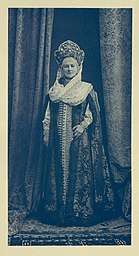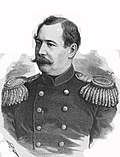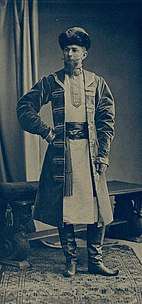Ilya Leonidovich Tatischev
Count Ilya Leonidovich Tatischev (Russian: Илья Леонидович Татищев) (11 December 1859, Saint-Petersburg[1] — July 1918, Yekaterinburg) was a Russian nobleman, Adjutant General to Tsar Nicholas II, executed by the Bolsheviks and canonized in the Russian Orthodox Church Outside Russia as a new martyr.
Count Ilya Tatischev | |
|---|---|
| Native name | Илья́ Леони́дович Тати́щев |
| Birth name | Ilya Leonidovich Tatischev |
| Born | 11 December 1859 Saint-Petersburg, Russian Empire |
| Died | July 1918 Yekaterinburg, Russia |
| Buried | Ivanovskoe cemetery |
| Allegiance | Russian Empire |
| Service/ | Imperial Guard Russian Emperor's Suite |
| Years of service | 1877 - 1917 |
| Rank | lieutenant general adjutant general |
| Unit | Hussar Regiment Cavalry |
| Spouse(s) | never married no issue |
Biography
Count Ilya Tatischev was born on December 11 (24), 1859, in Saint-Petersburg. His father was lieutenant general Count Leonid Alekseevich Tatischev (1827 — 1881),[1] his mother was Ekaterina Ilyinichna Bibikova (1836 — 1916),[1] the daughter of adjutant general and general of the artillery Ilya Gavrilovich Bibikov. His mother was a lady-in-waiting to Empress Alexandra Fyodorovna. In 1879 he graduated from the Page Corps.[2]
Together with his brother, Leonid, he owned the village of Protasovo, in the Saransky Uyezd (now Lyambirsky district) Penza Governorate.[3]
Military career
Count Illya Tatischev started military service in 1877.[4] In 1879 he entered the Hussar Regiment of the Russian Imperial Guard in the rank of cornet.[4] In 1890 he was appointed adjutant to Grand Duke Vladimir Alexandrovich as the Commander-in-Chief of the Imperial Guard and Saint-Petersburg Military District.[2] After five years in this rank, in 1895 he received the rank of colonel.[2] Since November 11, 1905, he was appointed the personal adjutant of Grand Duke Vladimir Alexandrovich.[2] In 1905, the son of Grand Duke Vladimir Alexandrovich, Kirill, was expelled from the Imperial House of Russia due to mismarriage. This caused his father to resign. The new commander, Grand Duke Nikolay Nikolayevich, dismissed Illya Tatischev on December 6, 1905.[5] However, on the very same day he was raised to major general and enrolled in the Imperial Suite.[5]
The new position obliged Count Tatischev to represent Tsar Nicholas II at the court of Emperor Wilhelm II,[5] which implied finding out secret information on the state of German military forces.[5] He stayed in Germany until April 15, 1914, when he asked for retirement and was commissioned back to Russia.[5] However, he remained close to Tsar Nicholas II.[5]
During WWI, Illya Tatischev served to the Chief Head of the Sanitary and Evacuation Unit of the Russian Red Cross Society Duke Alexander of Oldenburg.[6] In 1916 he was made lieutenant general of the Imperial Cavalry and appointed Adjutant General of Tsar Nicholas II.[4]

The Revolution
On April 18, 1917, he retired due to illness.[4] Soon, Count Tatischev joined the arrested Imperial family at Tsarskoye Selo.[5]
Tatiscev followed the emperor to his exile in Tobolsk. When in April 1918 Nicholas II and his wife were convoyed from Tobolsk to Yekaterinburg, Ilya Tatischev stayed in Tobolsk with their children as wished the empress.[3]
In May 1918, alongside the royal children, he was convoyed to Yekaterinburg, where together with Vasily Dolgorukov, he was kept in prison.[3] According to the witnesses, the two men were shot down by the Bolsheviks 10 days before the Imperial family.[3]

It is said that their bodies were found by nuns of the Novo-Tikhvinsky convent and buried at the Ivanopsvkoe cemetery.[3]
Canonization
In October 1981, Count Ilya Leonidovich Tatischev was canonized by the Russian Orthodox Church Outside Russia as a new martyr under the name of Holy Martyr Warrior Illya (Russian: Святой Мученик Воин Илья).[7]
Awards

Domestic awards:[4]
- Order of Saint Stanislaus: 3rd class (1886), 2nd class (1895), 1st class (1906).
- Order of Saint Anna: 3rd class (1891), 2nd class (1897), 1st class (1910).
- Order of Saint Vladimir: 4th class (1900), 3rd class (1903), 2nd class (1913).
Foreign Awards:[4]
- Order of the Lion and the Sun, Persia, (1878).
- Order of the Crown (Württemberg), (1890).
- Order of the Zähringer Lion, Duchy of Baden, Germany, (1890).
- Order of the Crown of Italy (1894), 3rd class, commander.
- Legion of Honour, France, (1894), Chevalier.
- Order of the Griffon, Mecklenernburg-Schwerin, Germany: Honour Cross (1895), Grand Commander's Cross (1897).
- Order of the Crown (Prussia), 2nd class (1898), 1st class (1907), 1st class with diamonds (1909).
- Order of Philip the Magnanimous, Hesse-Darmstadt, Germany: Commander's cross (1901), 1st class (1902).
- Order of the White Eagle, Serbia, 1st class (1915).
- Order of the Sacred Treasure, Japan, 1st class (1915).
References
- Жук Ю. А. Претерпевшие до конца: судьбы царских слуг, оставшихся верными долгу и присяге. Directmedia, 7 апр. 2015 г. С. 188.
- Жук Ю. А. Претерпевшие до конца: судьбы царских слуг, оставшихся верными долгу и присяге. Directmedia, 7 апр. 2015 г. С. 189.
- Архивные документы о генерал-адъютанте Свиты Николая II графе Илье Леонидовиче Татищеве (к столетию расстрела царской семьи) Archived 2018-12-30 at the Wayback Machine. 16 июля 2018.//Archive Department of the Ministry of Culture, National Policy, Tourism and Archives of the Republic of Mordovia.
- Officers of the Russian Imperial Army
- Жук Ю. А. Претерпевшие до конца: судьбы царских слуг, оставшихся верными долгу и присяге. Directmedia, 7 апр. 2015 г. С. 190.
- Жук Ю. А. Претерпевшие до конца: судьбы царских слуг, оставшихся верными долгу и присяге. Directmedia, 7 апр. 2015 г. С. 191.
- Жук Ю. А. Претерпевшие до конца: судьбы царских слуг, оставшихся верными долгу и присяге. Directmedia, 7 апр. 2015 г. С. 196.